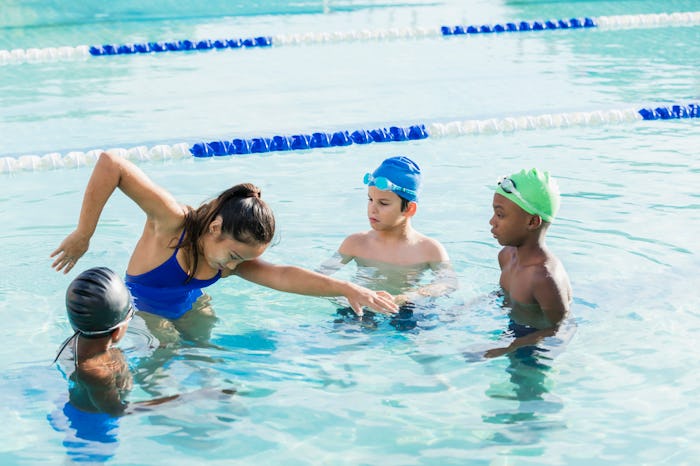Life

Are All Your Kid's Summer Activities On Hold? Here's What The Experts Say
Most of us have lost count of what day or week it is at this point in the pandemic. What we do know for certain is that we're now officially heading into summer. School for most of the United States is out, kids are (still) home, and parents are scratching their heads trying to decide what is and isn’t safe to do. Can you sign them up for swim lessons? Is tennis too risky? Do we need to sanitize the basketball after every bounce pass with the neighbor kid? Are kids' summer activities still happening this year?
As with so many uncertainties relating to the current state of affairs, there isn't a "yes" or "no" answer to this question. Whether or not your kids will be able to attend summer programming as planned will depend on the type of activities involved and your town or city's particular set of rules. Take sports, for example (historically one of the most popular themes for children's summer programs).
“As parents and for the kids, as players, there's going to be a variety of ways that every different sport is going to try and try and come back,” Samuel Browd M.D., professor of neurological surgery at University Washington and director of the concussion program at Seattle Children's Hospital says. As the director of the Sports Institute at the University of Washington, Dr. Browd is all too familiar with parents, kids, and coaches' desire to get back on the playing fields and courts, but he tells Romper that we need to be patient and expect a tiered rollout and return to our favorite games. Naturally, sports organizations are eager to return to business as usual, but that’s going to look very different moving forward.
“So these things that can be done where there's an ability to social distance, an ability to have a better hygiene around the equipment and the equipment that the player wears... we're still working through how we're going to best manage that,” says Dr. Browd. Sports leagues may not have new protocols figured out for this summer, realistically. The fall might be a better guess, but even then, deciding whether to allow your children to partake in group sports and activities is going to come down to a judgment call, one that might mean encouraging your kid to abandon a more high contact activity for something more individualized.
“Things are going to look really dramatically different for the foreseeable future. And again, this is going to come in different phases as different states feel more comfortable loosening restrictions,” says Dr. Browd. What he recommends is that parents communicate with sports organizers and summer program directors in general to find out what kind of new steps and safety protocols are being instituted... then keep that conversation going as activities reopen.
"I think there are a lot of things to think through just from a public health perspective,” Elizabeth Mack, M.D., M.S., the Director of Pediatric Critical Care at the Medical University of South Carolina, tells Romper. Yes, she says, we all know we need to remind children to use face coverings and wear masks, but when it comes to attempting to ease back into normal summer activities, parents really need to look at the state of virus testing. “What's tricky about kids is that at least with this particular virus, we have learned across the world that kids are much more likely to be asymptomatic or mildly symptomatic,” Dr. Mack says. “In other words, they could be walking around just little Petri dishes.” But an absence of symptoms doesn't mean your kid would test negative.
If you don’t feel comfortable enrolling your children in summer programming (assuming that's an option), what can you do? Some families are committing to only spend time with each other this summer (a variation on the bubble concept). That way kids at least have the opportunity to socialize. But signing off on that arrangement is just another judgement call.
“You need to know your kid's friend’s parents and they need to know you,” says Dr. Browd. Right now, he adds, a big factor in keeping families safe comes down to communication between neighbors. You need to trust that the other families involved are social distancing, too. It's when we forget to communicate that things can get dicey.
“People are being lulled into a sense of safety and comfort and starting to have some risky behavior,” says Dr. Mack. Her suggestion? Spare yourself the anxiety and opt your kids out of group activities, as tempting as they may be. Instead, use this time to discover new things as a nuclear family with adventures that are safe and socially distant: a family hike on an off-the-beaten-path trail, or a trip to the beach at dusk when the crowds have safely cleared, or at home improvement project that everyone can be a part of, like painting a child’s room or building a dollhouse.
“It's a good time to just focus back on our individual family units," says Dr. Mack. "Less video game time. More outdoor time.”
Experts:
Dr. Elizabth Mack, M.D., M.S. the Director of Pediatric Critical Care at the Medical University of South Carolina
Dr. Samuel Browd, M.D., Ph.D., FACS, FAANS, FAAP, Director of Seattle Children’s Hydrocephalus Program, Medical Director of Seattle Children’s Sports Concussion Program and Director of the Sports Institute at UW Medicine
This article was originally published on